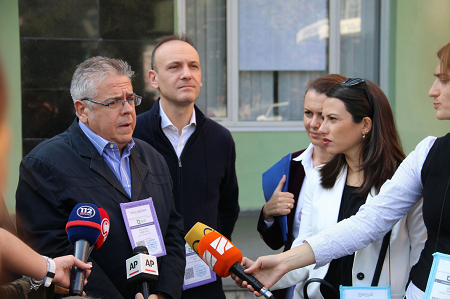International observers on election runoffs in Georgia: “Competitive, smooth and professionally run”

The parliamentary runoffs in Georgia on October 30 were competitive and administered in a manner that respected the rights of candidates and voters.
This was how the international observers monitoring the second round of parliamentary elections in Georgia assessed the process today.
"Yesterday’s second round reconfirmed that Georgia’s 2016 parliamentary elections enabled candidates to campaign freely and voters to make informed choices about their options,” said Ignacio Sanchez Amor, the Special Co-ordinator and leader of the short-term OSCE observer mission.
The joint assessment came from the OSCE Office for Democratic Institutions and Human Rights (OSCE/ODIHR), the OSCE Parliamentary Assembly (OSCE PA), the Parliamentary Assembly of the Council of Europe (PACE) and the European Parliament (EP).
The international observers assessed the voting process during the second round more positively than in the first round, and said polling station commissions were better prepared and adherence to procedures improved.
Voting on Election Day was assessed positively, although the observers said issues remained related to lacking a legal framework for second round elections and complaints related to first round results.
"Full regulation of second round voting is lacking in the law, and attention must be paid to legal investigation and complaints procedures, but I was pleased to see that election day was smooth and professionally run,” the leader of the short-term OSCE observer mission said.
Ambassador Alexandre Keltchewsky, Head of the OSCE/ODIHR long-term election observation mission also stressed that the Election Code didn’t regulate the second round.
"The lack of a legal framework for the second round had a noticeable impact on the process,” he said.
"Further steps should and can be made to address remaining challenges in law and practice and ODIHR is ready to assist the Georgian authorities in this process.”
Constitutional majority doubles responsibility
Ana Gomes, Head of the EP delegation stressed how much of responsibility was attached to holding a constitutional majority.
"The stakes in this second round were very high, with the ruling party aiming at obtaining a constitutional majority,” she said.
"Early electoral results seem to confirm this. Therefore particular responsibility lies with the majority. It needs to use this power to benefit the country, rather than for political retribution.”
"Ensuring respect for the institutional checks and balances between the different branches of power, and for the democratic roles of the majority and of the opposition is of paramount importance.”
Proper reaction to complaints is important
The observers noted that in the period following the first round Election Day, district election commissions received over 1,100 complaints mainly regarding the counting process in polling stations. Weaknesses were noted in the adjudication of complaints. Complainants were not always notified about the time and place for consideration or provided with copies of decisions and in a number of cases thorough investigations were not conducted.
"The withdrawal of some candidates between the first and second rounds is a serious issue and the motivation of these withdrawals should be thoroughly analysed,” said Emanuelis Zingeris, Head of the PACE delegation.
"Legal investigation of the irregularities in the first round must be completed. It goes without saying that allegations, coming from all sides, on irregularities during the second round must be carefully evaluated as well.”
The mission stressed that in the short and subdued campaign, media coverage was more balanced than for the first round and Election Day procedures were conducted in a smooth and professional manner.
 Tweet
Tweet  Share
Share